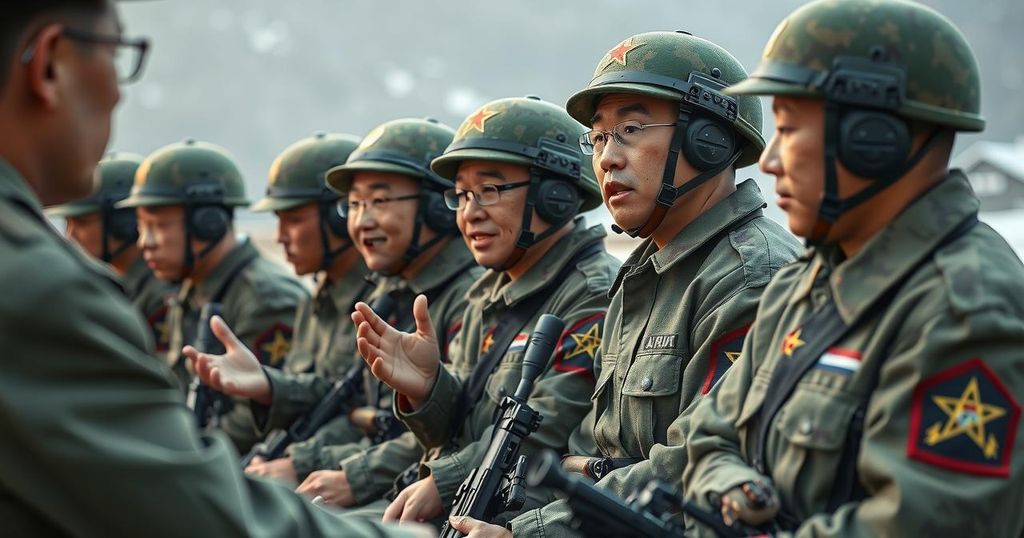Challenges and Loyalties of North Korean Troops Deployed in Russia’s War

Former North Korean soldiers, including defectors, recount their harrowing experiences of malnutrition and harsh conditions in the military. Approximately 11,000 troops are reported to have been deployed to Russia, with casualties already logged in the ongoing Ukraine conflict. Although they come from an elite unit, challenges such as limited combat experience, language barriers, and ideological indoctrination hinder their operational effectiveness.
Haneul, a former North Korean soldier, vividly recalls the relentless hunger he faced during his military service, losing 10 kg in his first month due to inadequate rations. The situation proved dire; nearly his entire battalion suffered from severe malnutrition, necessitating their transfer to a recovery center for nourishment. Later, when serving as border guards, the allocation of rice was inadequate, often diluted with sand after being pilfered by rear units. Though well-fed compared to others—displaying a tactic to discourage defections—Haneul managed to escape to South Korea in 2012.
His experiences are reflective of the conditions likely faced by the approximately 11,000 North Korean troops deployed to Russia amid the conflict in Ukraine. Reports indicate these soldiers have engaged in combat with frequent casualties, with South Korean officials estimating over 100 fatalities. Despite their challenges, defectors like Lee Hyun Seung assert that the special Storm Corps unit from which many troops hail possess high morale, albeit limited exposure to modern combat tactics and malnutritious diets.
Lee also noted the selection process for the Storm Corps, which favors taller, athletic individuals, hinting at a rigorous yet insufficient training regimen. Online footage highlights their physical frailty, contrasting sharply with North Korean propaganda. Haneul reminisces about his continuous lack of combat experience, emphasizing that he fired only a few bullets in his entire service, leaving him woefully unprepared for actual warfare.
The defectors express skepticism about these soldiers’ capacity to adapt to combat in the flat terrain of Kursk, as their training primarily emphasizes mountainous terrain. However, Kim Jong Un appears to prioritize sending capable special forces rather than regular soldiers, who often engage in non-combat labor. The defectors suggest that while these soldiers may display resilience and loyalty, their operational effectiveness could be hindered by insufficient supplies and language barriers, leading to tragic miscommunications with Russian forces.
Despite the challenges ahead, defectors urge that the fighting spirit and dedication of these troops should not be underestimated. Many soldiers may perceive deployment as a career advancement opportunity, highlighting a stark contrast to Russian soldiers. Although casualties are likely and Kim Jong Un can afford such losses without destabilizing his regime, significant loyalty remains among the soldiers and their families, complicating defection efforts.
The distinct challenges in facilitating defections from these North Korean troops are underscored by their indoctrination into perceiving capture as dishonorable. Efforts to encourage surrender may be further thwarted by threats from their leaders, prompting the soldiers to take self-destructive measures rather than risk capture. A former trainer from the North Korean special forces is committed to assisting these individuals by offering to communicate with them at the front lines, acknowledging that their sense of loyalty will arguably dominate their experiences of conflict. Haneul’s primary hope, however, is that his relatives among the ‘volunteering’ troops safely return to North Korea, evoking the poignant reality of sentiments held within many families affected by military service.
The ongoing conflict between Russia and Ukraine has seen various international dynamics, including reports of North Korean troops being deployed to aid Russian efforts. Historical insights from defectors reveal severe conditions within the North Korean military, characterized by malnutrition, strict training protocols, and rigid loyalty to the regime. Understanding the psychological and physical implications of such deployments is crucial when assessing the capabilities and motivations of these troops. The insights from former soldiers provide a deeper understanding of the complex interplay between military service, regime loyalty, and individual aspirations among those deployed.
In conclusion, the deployment of North Korean troops in the Russian-Ukrainian conflict exemplifies the dire realities faced by these soldiers, marked by inadequate training, malnutrition, and unwavering loyalty to their regime. Despite these challenges, their morale and commitment should not be underestimated, rendering them potential assets to the Russian military operation. As the situation unfolds, the opportunities for defection appear slim, owing to deeply ingrained ideological beliefs and the harsh repercussions associated with surrender or capture. Ultimately, while the effectiveness of these troops remains uncertain, their background and loyalty paint a complex picture of their role in the ongoing conflict.
Original Source: www.bbc.com








